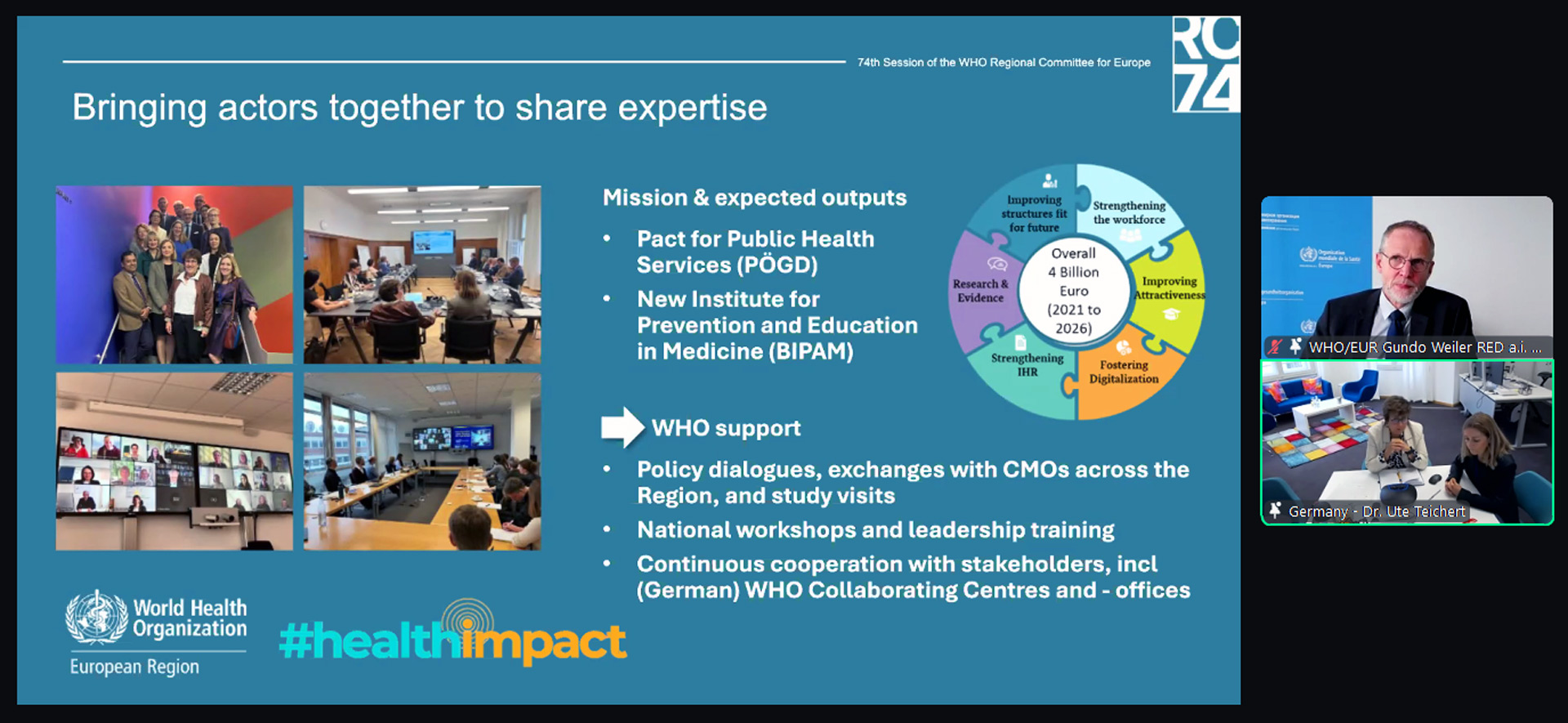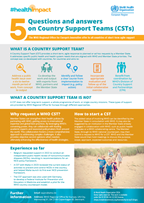
RC74 side event: A more relevant and responsive WHO - delivering impact in countries
16 September 2024
A more relevant and responsive WHO: delivering impact in countries – sharing experiences and opportunities
16 September 2024, 10:00–11:30 (CEST)
Event highlights
17 September 2024
The third side event of the 74th session of the WHO Regional Committee for Europe on delivering impact in countries welcomed over 80 participants from 15 Member States and several non-state actors.
At the event, participants reflected on progress over the 2 years since the Country Strategy to enhance WHO’s relevance and impact in countries was adopted.
Four examples of new and innovative forms of collaboration were discussed.

Country Cooperation Strategies
Professor Adriana Pistol, Secretary of State, Ministry of Health of Romania and Dr Caroline Clarinval, WHO Representative in Romania, shared their experiences in using a Country Cooperation Strategy (CCS) to strengthen national health policies. Romania is making advances in key health areas as part of its National Recovery and Resilience Plan, guided by the 7-year CCS it signed with WHO in 2024. This provides both the framework and process for taking forward policy guidance and technical assistance in key areas including capacity-building for public health fund management, strengthening human resources and developing eHealth and telemedicine systems. To date, key lessons in using the CCS include the need for meaningful stakeholder engagement in order to ensure buy-in and advance activities, and making strategies and recommendations pragmatic and actionable.
Subregional Strategies
Dr Mederbek Ismailov, First Deputy Minister of Health of Kyrgyzstan and Dr Liviu Vedrasco, WHO Representative in Kyrgyzstan, outlined how strategic collaboration has broadened into a subregional approach, working with a group of countries through the Roadmap for Health and Well-being in Central Asia. Dr Ismailov explained that WHO’s structured approach to collaboration facilitates dialogue and builds effective networks, to maintain focus and momentum on shared health and economic priorities.
Country Support Teams
Professor Charmaine Gauci, Superintendent of Public Health and Director General for Public Health, Ministry for Health and Active Ageing in Malta, and Dr Kristina Mauer-Stender, Team Leader, Country Implementation Support for Impact, WHO/Europe, detailed how Malta is launching a Noncommunicable Disease Prevention Policy Framework using the insights gained from a WHO Country Support Team (CST). Malta sought WHO/Europe’s help to gain a broader perspective on the noncommunicable disease issue, ensure alignment with international standards and milestones, and to provide critical feedback as a “trusted friend”. Key learnings from Malta’s CST have been recognizing that it is a co-production, listening to stakeholders to achieve well-reasoned recommendations, having a non-technical coordinator within WHO to manage inputs from both parties, and organizing follow-up for lasting impact.
WHO Country Counterparts
Dr Ute Teichert, Director General and Chief Medical Officer, Directorate for Public Health, Federal Ministry of Health of Germany and Dr Elke Jakubowski, Senior consultant, WHO/Europe, assigned to the Directorate for Public Health, described how Germany is advancing public health reforms and establishing a prevention institute with support from a WHO Country Counterpart. The designated Country Counterpart has facilitated policy dialogues, exchanges with chief medical officers, workshops and leadership training, and stronger cooperation with stakeholders. This ongoing collaboration has underlined the importance of clear communication and well-defined roles, and the benefits of using a dedicated liaison during times of change. The mix of diplomatic partnership and technical collaboration, as well as WHO’s role as an impartial convener, were identified as important advantages.
Country Impact Report
A Country Impact Report, showcasing inspiring stories of collaboration and health impact from the 53 countries in the WHO European Region is being co-developed, based on interviews and learning from those directly involved in the initiatives. The report will be published in time for the 74th session of the WHO Regional Committee for Europe. Driving impact for better health and well-being in countries Driving impact for better health and well-being in countries (who.int)
Event notice
16 September 2024, 10:00–11:30 (CEST)
The implementation of the strategy for collaboration between the WHO Regional Office for Europe and Member States in the Region is well under way, following its successful adoption during RC72. The strategy, which was co-created with Member States, serves as a guiding framework for enhancing WHO’s relevance and impact in countries, which lies at the heart of the European Programme of Work, 2020–2025 (EPW).
As the initial timeline for the EPW draws to a close, this is an opportune moment to consider the felt difference that WHO/Europe aims to make at the country level, and identify opportunities to further shape meaningful change. Country impact is a central focus of this year’s WHO Regional Director for Europe’s report, which is accompanied by a compendium of country impact stories currently in development. This session will offer Member States and partners an opportunity to share their experiences so far of WHO’s enhanced collaboration, and to further familiarize themselves with the range of opportunities that are available to enable them work with WHO at the country level. The event will highlight WHO's efforts to prioritize country needs and to keep countries at the centre of its work.
Through the use of real-life examples presented by Member States and WHO, this side event will focus on showcasing “what” has been accomplished to support countries to meet their priorities over the past four years, and “how” strategic approaches and innovative ways of working together have been implemented to achieve greater impact. This event will serve as a platform to reinforce the collaborative efforts being made to identify, share and apply lessons for continuous improvement.
Country profiles
Documents






